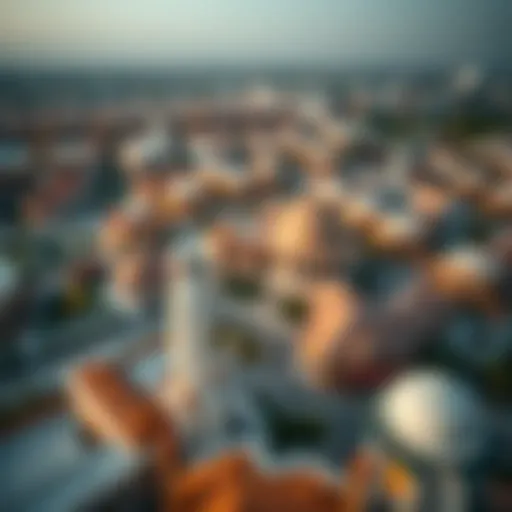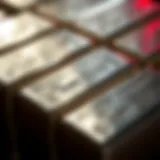Insights into Dubai's Real Estate and Lifestyle
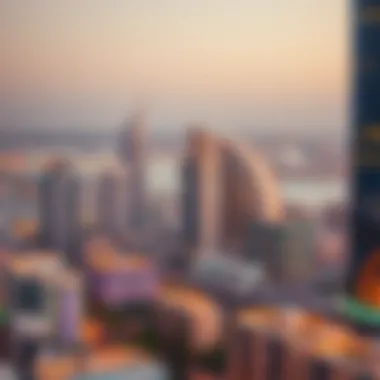

Intro
Dubai has transformed from a quiet fishing village to a bustling metropolis, reflecting the aspirations and dynamism of its inhabitants. As the city grows, its real estate market evolves, revealing layers of opportunity and lifestyle that intrigue many. Whether you are a homebuyer searching for your dream property or an investor keen on capitalizing on market trends, understanding the intricacies of Dubai’s property scene is vital.
With towering skyscrapers like the Burj Khalifa and luxurious developments like Palm Jumeirah, the allure of Dubai is palpable. This article provides a thorough exploration of the current real estate trends, potential investment avenues, and the lifestyle that befits living in this vibrant city.
The following sections delve into market conditions, future predictions, and strategies for those eyeing real estate opportunities within Dubai. Such insights, backed by thorough analysis, are intended to guide readers in making well-informed decisions in a dynamic environment.
Market Trends
Current Real Estate Market Conditions
The Dubai real estate market has shown resilience and adaptability in recent times. Despite global economic fluctuations, the city continues to attract both domestic and international investors. The current market conditions can be characterized by a surge in demand for luxurious properties and a stable increase in rental prices, especially in high-demand areas.
Several factors contribute to this vibrant market:
- Population Growth: The influx of expatriates and skilled professionals adds to the demand for housing. As the city evolves into a global hub for business and tourism, the population continues to swell.
- Government Initiatives: Various initiatives, including long-term visas for investors and retirees, have made Dubai more attractive to foreign buyers.
- Diverse Offerings: From affordable apartments to high-end villas, there is a property type for every buyer's taste and budget.
In early 2023, property prices witnessed an average increase of around 10%, leading many to consider Dubai a favorable location for investment.
Future Projections and Growth Areas
Predicting the future of Dubai’s real estate market involves looking at emerging growth areas. Analysts expect certain locales to become increasingly desirable.
- Dubai Creek Harbour: Positioned to become the region’s next urban center, this area is poised for significant development, including residential complexes and commercial spaces.
- Dubai South: This is where the Expo 2020 site lies. With infrastructure improvements and future projects in the pipeline, it is on track to boom.
- Jumeirah Village Circle (JVC): Affordable living options combined with accessibility to key areas of the city make JVC an attractive choice for both residents and investors.
The next few years will likely bring sustained growth, making it imperative for potential investors to keep an eye on these up-and-coming neighborhoods.
Investment Insights
Best Areas for Real Estate Investment
Identifying the right area for investment is crucial. Here are some neighborhoods worth considering:
- Downtown Dubai: Known for luxury and high returns, properties here, like those near Dubai Mall and Burj Khalifa, are evergreen in demand.
- Dubai Marina: This area boasts stunning waterfront views and remains a favored spot for expatriates, ensuring steady rental income.
- Business Bay: With a mix of commercial and residential projects, Business Bay is a hot spot for professionals seeking convenience and modern amenities.
Tips for First-Time Investors
For those looking to dip their toes into the Dubai real estate market, having the right approach can simplify the process. Consider the following tips:
- Understand Market Dynamics: Being aware of the latest trends and developments can help in making strategic decisions.
- Engage a Local Real Estate Agent: Network with professionals who have their finger on the pulse of the local market. They can offer insights that are not readily available.
- Clarify Your Budget: Set a clear financial plan that aligns with your goals to avoid overextending your resources.
Having a clear roadmap can make a world of difference, making the journey into property investment a lot smoother.
Real Estate Landscape
The real estate landscape in Dubai is a crucial element in understanding the dynamics of this bustling metropolis. Not only does it showcase the architectural marvels that have sprung up over the years, but it also reflects the economic vigor and aspirations of its residents and investors. As the sun shines down on the skyscrapers that pierce the clouds, one finds a tapestry woven with diverse cultures, booming businesses, and transformative infrastructure. This multifaceted perspective on real estate is vital for investors, home buyers, and property managers alike.
Dubai’s real estate market operates in a unique environment shaped by both local traditions and global influences. The benefits of understanding this landscape stretch beyond mere property transactions. For investors, knowing the ebb and flow of market trends can lead to astute buying decisions, while home buyers can better assess their needs against what the market has to offer. Furthermore, property managers can leverage knowledge of the market dynamics to enhance the value of their portfolios.
Current Market Trends
In the current climate, several trends are altering Dubai’s real estate narrative. Notably, the shift towards affordable housing has gained momentum. Buyers today are looking for value above all else, leading developers to pivot towards more economically priced options. With the upcoming Expo 2025, there is also heightened anticipation for an influx of visitors, which could reinvigorate the rental market.
The rise of sustainable developments is another notable trend. Projects that emphasize energy efficiency and sustainable practices are gaining traction, responding to an increasing awareness of environmental concerns. This aligns with Dubai's vision to establish itself as a pioneer in sustainability on a global scale.
Investors are also encouraged to keep an eye on the tech-driven changes in the market. Smart home features and proptech solutions are providing more transparency and efficiency in transactions, ultimately reshaping how properties are marketed and managed.
Historical Context of Real Estate
To appreciate the present-day real estate landscape, one must delve into its historical context. Dubai began its journey as a small fishing village, primarily built around pearl diving and trade. It wasn’t until the discovery of oil in the 20th century that a remarkable transformation took place. The economic boom that followed attracted both local and foreign investments, paving the way for rapid urban development.
Over the years, the emirate has seen substantial legislative changes aimed at facilitating foreign ownership and investment. Initiatives like the 2002 law allowing expatriates to own properties in designated areas catalyzed a surge in development projects, contributing significantly to Dubai's skyline as we know it today.
Up until now, the challenges faced by the real estate sector, such as the 2008 financial crisis, have shaped not only the regulations but also the investor’s mindset. With recovery efforts and strategic planning in place, Dubai has adeptly navigated these challenges to emerge as one of the prominent global investment destinations.
Comparative Analysis with Other Global Cities
When comparing Dubai’s real estate market with other global cities, its unique allure becomes evident. Unlike cities where regulations often obstruct swift transactions, Dubai boasts a relatively streamlined process for property buying. This efficiency draws a varied pool of international investors.
In cities like New York or London, buyers often find themselves grappling with extensive bureaucracy and high costs of entry. On the contrary, Dubai's competitive pricing and high-return potential make it a favorite among new investors looking to maximize their capital. Moreover, the quality of life and vibrant lifestyle offered in Dubai is unmatched by many leading cities.
Furthermore, the city’s strategic positioning as a gateway between the East and the West enhances its desirability. The tax-free environment combined with a melting pot of cultures creates a highly appealing backdrop for both individuals and corporate investments.
Despite clouds of market volatility, Dubai continues to stand tall, enchanting investors and prospective residents alike with its bold vision for real estate and urban living.
Investment Opportunities
When considering the multifaceted real estate market in Dubai, it’s impossible to overlook the investment opportunities it presents. This vibrant city has carved a niche for itself as a prime destination for those looking to invest in property. The importance of this topic is not just in identifying potential markets, but in understanding the underlying dynamics that influence investor decisions.
Real estate in Dubai is often viewed as a promising avenue due to its unique economic landscape, regulatory framework, and cultural diversities. Investors can tap into various sectors, including residential, commercial, and even hospitality, which opens up a plethora of possibilities for return on investment (ROI).
Let’s delve deeper into some specific areas that are critical for any savvy investor:
Emerging Neighborhoods
Dubai’s urban layout is constantly evolving, and with that comes a host of emerging neighborhoods. Areas that were once considered peripheral are now at the forefront of development, attracting both local and foreign investors. Places like Dubai Marina, Jumeirah Lake Towers, and Dubai South are witnessing a transformation, making them increasingly desirable.
Investing in these neighborhoods can provide several benefits:
- Appreciation Potential: Often, investing early in a developing area can lead to significant capital appreciation as infrastructure and amenities are improved.
- Lower Entry Costs: Prices in emerging neighborhoods tend to be lower than in established areas, offering a more affordable entry point.
- Community Development: These neighborhoods often attract families and young professionals, creating a vibrant community atmosphere and further driving demand.
Commercial vs Residential Investments
When it comes to commercial vs residential investments, each type has its own set of advantages and challenges. Understanding these variations is crucial for strategizing one’s investment approach.


Residential Investments:
- Stable Demand: There’s consistently high demand for rental properties due to Dubai's influx of expatriates.
- Longer Leases: Residential leases tend to be more stable, with many tenants renewing leases yearly.
- Potential for Capital Appreciation: Well-placed residential properties often appreciate over time given the city’s growth.
Commercial Investments:
- Higher Yield: Generally, commercial properties, such as offices and retail spaces, yield higher rents compared to residential.
- Investor Control: Investors often have more control over long-term leases, reducing vacancy risks.
- Economic Indicators: The performance of commercial spaces directly correlates with the health of the economy, allowing for strategic forecasting.
Choosing between commercial and residential investments depends on individual financial goals and risk appetite. Some investors even find it advantageous to diversify their portfolios across both sectors.
Understanding ROI in Dubai
Finally, understanding ROI in Dubai is critical for assessing an investment's value. In simple terms, ROI is a measure used to evaluate the efficiency of an investment. In the context of Dubai’s real estate market, several factors come into play:
- Market Trends: Keeping tabs on market fluctuations, such as pricing trends and absorption rates in specific neighborhoods, can provide clarity on expected returns.
- Rental Yields: According to various reports, Dubai offers one of the highest rental yields in the world, particularly in popular expat areas. Yield calculations often involve dividing annual rent by property price.
- Capital Growth: This metric evaluates how much value a property gains over time, taking into consideration both the location's growth and the overall economic landscape.
Analyzing ROI is not merely about crunching numbers; it involves an understanding of market nuances and potential growth trajectories.
In essence, Dubai provides a rich tapestry of investment opportunities, each with its unique considerations and potential benefits, making it a goldmine for discerning investors.
Lifestyle Considerations
The concept of lifestyle in Dubai stands as a pivotal aspect, influencing not just the inhabitants’ daily lives but also shaping the city’s real estate preferences. Understanding the lifestyle considerations provides a frame of reference for investors and potential property buyers regarding the kind of communities they might want to be a part of. It delves into dimensions such as cultural diversity, standard of living, and the social interactions within urban frameworks. Each of these elements plays a significant role in determining both the desirability of specific areas and the overall investment potential.
Cultural Diversity
Dubai is often termed a melting pot of cultures, housing a myriad of nationalities. This remarkable blend fosters a vibrant social fabric that enriches the day-to-day lives of its residents. The cultural diversity manifests itself in culinary choices, festivals, and lifestyle practices. From the bustling streets of Deira, where you can find traditional markets selling spices and textiles, to the modern dining experiences in Downtown Dubai, every corner reflects a slice of the world.
Investors should recognize that this cultural mosaic not only enhances Dubai’s appeal but also creates significant opportunities for businesses catering to diverse communities. Homebuyers may find this a crucial factor when selecting neighborhoods that reflect their lifestyle preferences or provide a sense of community.
Living Standards and Amenities
Living standards in Dubai are significantly high, with an abundance of amenities contributing to a luxurious lifestyle. This city is known for its skyscrapers, green parks, and high-end shopping malls, making it attractive for both expats and locals. Not to mention, the extensive transport network, including metro systems and roadways, ensures easy accessibility across various regions.
Moreover, the quality of schools, hospitals, and recreational facilities varies widely, creating options tailored to different lifestyles and financial capacities. Living in places like the Dubai Marina or Jumeirah Beach Residence allows residents access to gorgeous views and upscale leisure activities.
- High-quality schools: International curriculum available for various education systems.
- Healthcare facilities: World-class hospitals and clinics with diverse specializations.
- Recreational options: Parks, gyms, and community centers cater to active lifestyles.
With such amenities, investors must consider the long-term value of properties located in areas that offer superior living standards.
Social Dynamics in Urban Development
As Dubai continues to grow, the social dynamics within its urban development reveal insights into how communities interact and evolve. The concept of community living is integrated into planned cities like Mohammed Bin Rashid City, which aims at fostering friendships and encouraging social gatherings.
There is a noticeable shift toward incorporating more sustainable and inclusive urban designs. This includes pedestrian-friendly areas, community gardens, and play zones for children. The increased focus on enhancing social cohesion and accessibility points toward a future where social interactions are considered as critical as the infrastructure itself.
"Investing in areas that prioritize community development will likely yield greater returns, as they appeal to the modern family seeking a balanced lifestyle."
Potential investors should be mindful of how these social dynamics might affect community appeal and thus, the property values over time. With the ongoing urban transformation, neighborhoods that resonate well with the desires of residents will likely be in higher demand.
Property Management
Property management holds a pivotal role in the intricate fabric of Dubai's real estate landscape. It encompasses the oversight and administration of residential, commercial, and mixed-use properties. Effective property management is not just about maintaining buildings; it's also about enhancing property value, ensuring tenant satisfaction, and maximizing returns for investors. With such a dynamic market, understanding the nuances of property management can lead to better decision-making — both for investors and tenants alike.
The benefits of engaging in sound property management practices are manifold. Firstly, well-managed properties tend to attract quality tenants, minimizing vacancies and ensuring steady rental income. Moreover, effective management helps in maintaining the property’s condition, thus preserving its value over time. For expats and immigrants, which are in plentiful supply in Dubai, encountering a well-managed property can significantly ease the transition into their new lives.
There are several considerations for property owners when it comes to management. These can range from selecting the right management company, setting rental rates based on market trends, to understanding tenant rights and legal implications. The property management landscape in Dubai is inherently linked to the broader real estate market; therefore, staying informed about current trends is crucial for success.
Effective Management Strategies
An effective management strategy in Dubai should address several key areas to ensure optimal operational efficiency. First, rigorous screening processes for tenants can significantly reduce the likelihood of rental issues down the line. This often includes background checks, rental history verification, and financial assessments. It's also essential to establish clear communication channels, fostering a cooperative relationship between landlords and tenants.
Utilizing local expertise is another effective strategy. Property managers who deeply understand Dubai's unique market conditions, cultural considerations, and regulatory environment can create tailored management plans that address specific challenges. Regular property maintenance and timely communication regarding any repairs or improvements can also enhance tenant satisfaction and loyalty.
Legal Considerations for Property Managers
Navigating the legal landscape of property management in Dubai requires careful attention. It’s crucial for property managers to be well-versed in the real estate laws governing the area. The Real Estate Regulatory Agency (RERA) outlines numerous regulations that affect property management.
Key legal aspects to be aware of include tenancy agreements, eviction processes, and rental increase guidelines. For example, landlords must comply with specific protocols when it comes to rent increases, often involving notices and adhering to specified timeframes. Additionally, substantial fines can be imposed for failure to maintain adequate safety standards or for not adhering to RERA guidelines. Thus, keeping abreast of legal changes and engaging with legal expertise can prevent costly oversights.
Technological Impact on Management Practices
Technology is reshaping property management in Dubai at a rapid pace. From integrated property management software to virtual tours, the methods by which properties are managed and viewed are evolving. This evolution is not merely for convenience; it enhances efficiency and tenant experience.
Automation in leasing processes simplifies tasks such as rent collection and tracking, saving valuable time for both managers and tenants. Additionally, virtual reality property showcases allow potential tenants to explore spaces from anywhere in the world, broadening the tenant base and ensuring quicker occupancy rates.
With the right approach to property management, investors can turn potential pitfalls into lucrative opportunities in Dubai's vibrant market.
For more on property management laws in Dubai, visit RERA or consult Wikipedia.
Explore further insights from industry experts on platforms like Reddit and join discussions on Facebook for real-time updates and community support.
Regulatory Framework
In the intricate web of Dubai's rapidly evolving real estate environment, understanding the regulatory framework is paramount. This framework forms the backbone of real estate transactions and provides the safeguards necessary for investors, buyers, and managers alike. It lays out the rules that govern property ownership, transactions, and developments, ensuring transparency and legality. Without a robust regulatory framework, chaos could ensue, affecting trust and investment stability. Therefore, having insights into this framework is essential for making informed decisions.
Understanding Dubai's Real Estate Laws
Dubai's real estate laws are designed to balance the interests of local and foreign investors while promoting sustainable development. One of the cornerstones of these laws is Law No. 7 of 2006, which established the Real Estate Regulatory Agency (RERA). This agency plays a crucial role in overseeing real estate transactions, ensuring that both buyers and sellers adhere to established norms.
Key aspects to consider:
- Property Ownership: Foreigners can own property in designated areas, which significantly boosts investment appeal.
- Title Deeds: All property acquisitions necessitate proper registration with RERA, ensuring ownership rights are secured.
- Dispute Resolution: The Dubai Land Department offers avenues for dispute resolution, helping mitigate potential conflicts between parties.
By being aware of these laws and how they function, investors can navigate the market with confidence.
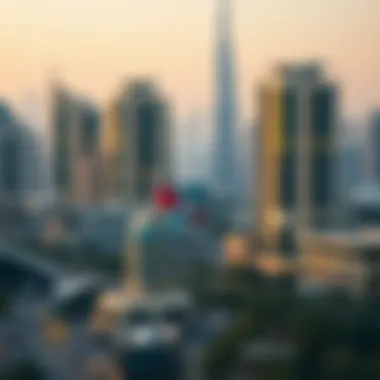

Role of Government in Real Estate Development
The government of Dubai plays an active and dynamic role in the city's real estate development landscape. It serves not only as a regulator but also as a facilitator of growth. One of the key instruments used is the creation of free zones, which entice various sectors to set up businesses, leading to increased demand for residential and commercial properties.
Some noteworthy initiatives include:
- Special Economic Zones: Areas like Jebel Ali free zone have attracted significant foreign investment, driving urban expansion.
- Infrastructural Projects: The government's commitment to infrastructural improvements directly affects property values and livability.
- Policy Initiatives: Programs like Dubai 2040 Urban Master Plan aim to enhance the city’s sustainable urban development strategies.
The government's supportive stance not only bolsters investor confidence but also ensures a thriving real estate market.
Real Estate Schemes and Initiatives
Dubai constantly innovates through various real estate schemes and initiatives aimed at boosting investment interest, especially amid changing global economic conditions. These schemes are tailor-made to cater to diverse needs of potential investors and residents.
Some significant initiatives include:
- 10-Year Golden Visa: A long-term residency option for investors which encourages substantial investment in Dubai property.
- Property Lasting Contracts: This initiative allows property investors to secure return on investments without the worry of frequent regulatory shifts.
- Affordable Housing Programs: To create a balanced living environment, the government has implemented options to make housing more accessible for lower to middle-income residents.
These initiatives signify the proactive approach of Dubai’s administration in adapting to global trends while fostering an attractive environment for real estate ventures.
"The ever-evolving regulatory framework ensures that the investment landscape remains vibrant, while fostering trust and stability within the market."
Through a keen understanding of Dubai's regulatory framework, potential investors can better position themselves in this bustling market, leveraging the myriad of opportunities that the city offers.
Sustainability and Future Outlook
Understanding sustainability in Dubai's evolving landscape is crucial for potential investors and home buyers. The city is rapidly transforming, and with this change comes a significant responsibility to ensure that growth does not come at the expense of ecological balance. This section aims to shed light on how Dubai is repositioning itself for a sustainable future, addressing specific elements, benefits, and considerations.
Sustainable Developments in Dubai
Sustainable development initiatives in Dubai have gained notable traction. The city's vision for sustainability includes a push toward eco-friendly construction methods and materials. For example, developments such as The Sustainable City feature energy-efficient buildings, solar powered initiatives, and lush green spaces aimed at fostering a community-centric lifestyle. The overarching goal here is not only to provide housing but also to create livable, environmentally-friendly communities that support a high quality of life.
"Sustainable cities aim to be adaptive and resilient, balancing the needs of residents while maintaining ecological integrity."
Some benefits witnessed include reduced energy costs and improved health outcomes for residents. The integration of technology, such as smart meters and energy-efficient appliances, allows for better monitoring of energy consumption. As the smart city concept takes root, one can expect to see an increase in sustainable practices across various sectors.
Future Trends in Urban Planning
Thinking ahead, urban planning trends in Dubai are reflecting a commitment to sustainability. Planners are laying the groundwork for mixed-use developments that create a symbiotic relationship between residential, commercial, and recreational spaces. The idea is to minimize reliance on vehicles, with an emphasis on pedestrian-friendly pathways and public transport systems.
One of the emerging trends is the incorporation of green spaces, which serve both ecological and social purposes. Parks, community gardens, and nature corridors are becoming integral to development plans. Furthermore, smart infrastructure will play a crucial role, as data-driven solutions help optimize traffic flows and resource management.
Impact of Global Influence on Local Market
As globalization takes its course, Dubai’s market is increasingly influenced by international sustainability standards. The introduction of regulations aligned with global best practices encourages developers to green-light projects that adhere to environmental expectations. This is more than just a matter of compliance; it is about positioning Dubai as a key player on the global stage.
Moreover, international stakeholders are likely to favor developments that demonstrate environmental responsibility. This can enhance investor sentiment while building trust among potential home buyers. With sustainability becoming a pivotal factor in investment decisions, Dubai’s local market is evolving to attract a more discerning, environmentally-conscious clientele.
Understanding Expat Life
Understanding expat life in Dubai is pivotal for anyone looking to navigate this vibrant city, especially for investors, home buyers, and property managers. The dynamic blend of cultures and lifestyles found in Dubai significantly shapes the residential landscape and the overall experience of living here.
Housing Preferences Among Expats
Expatriates in Dubai often exhibit unique housing preferences that differ from local residents. Many expats opt for modern apartments or luxurious villas, highlighting a preference for amenities and facilities that facilitate a comfortable lifestyle. Areas like Dubai Marina and Jumeirah often attract those looking for a vibrant community with easy access to the beach or nightlife. On the other side, families may lean towards more spacious residences in suburban areas like Arabian Ranches or Dubai Hills, where schools and parks are easily available.
In particular, housing costs can be a deciding factor. Monthly rentals can range widely, so understanding the market is key. For example, a typical one-bedroom apartment in Downtown Dubai might average around AED 7,000, while the same in less central areas can drop to AED 4,000. This price sensitivity plays a crucial role in shaping where expats choose to settle. Also, many expats prefer furnished options, as it simplifies the transition to their new environment.
Cultural Integration and Challenges
Cultural integration forms a significant part of the expat experience. While Dubai is known for its cosmopolitan vibe, adjusting to local customs and traditions can pose challenges. On one hand, the city’s diverse makeup allows expats to indulge in their cultural celebrations, like Diwali and Christmas. However, the Islamic customs can be a source of confusion. For instance, public displays of affection are frowned upon, and understanding these nuances fosters a more harmonious living experience.
Another challenge expats face is navigating the local social scene, which can sometimes feel exclusionary. Many find it takes time to build genuine connections, particularly as newcomers. Engaging actively in community events or clubs related to personal hobbies is a great way to bridge this gap. Expats who integrate well often find that their quality of life improves significantly, as friendships can extend beyond the work circle.
Support Systems for New Residents
When moving to a new city, especially one as fast-paced as Dubai, having support systems in place is vital. Organizations such as Internations provide platforms where newcomers can meet others in similar situations. Networking events and social dinners help create connections and provide a sense of belonging. Virtual resources, including community forums on Reddit or Facebook groups, offer valuable information regarding housing, schools, and local events that can ease the acclimatization process.
Moreover, the availability of family-oriented services such as language classes or expat support groups can aid in fostering a community atmosphere, allowing for greater ease in adjusting to life in the UAE.
"Dubai is not just about skyscrapers; it's about the lives that unfold within them."
For further exploration of the expat life in Dubai, check out resources like Britannica, or use forums on Reddit for community-led advice.
Community Development
Community development is a cornerstone of urban evolution in Dubai, reflecting the city’s commitment to foster spaces where residents and newcomers alike can thrive. As the city continues to transform at breakneck speed, understanding the nuances of community development helps investors, home buyers, and property managers appreciate how vibrant, interconnected neighborhoods shape the overall living experience.
A well-planned community can improve quality of life through public amenities, sustainability initiatives, and cultural engagement. These factors not only attract potential residents but also enhance the value of properties. By diving deep into specific elements of community development, we highlight why this topic deserves attention among those looking to invest or buy in Dubai’s rapid real estate market.
Public Amenities and Services
The backbone of any thriving community is its public amenities and services. In Dubai, these facilities are not just functional; they are designed to offer a high standard of living. Parks, gyms, libraries, schools, and healthcare centers are strategically dispersed throughout the neighborhoods to create balance and accessibility.
For instance, consider the waterfront communities such as Dubai Marina. Here, you’ll find ample green spaces alongside jogging paths, recreational areas, and marine access. These amenities not only serve current residents but also make the area appealing to potential buyers.
The effectiveness of these facilities hinges on proper maintenance and community engagement. Services provided by local authorities, such as waste management and safety patrols, contribute greatly to residents’ satisfaction. An organized community where residents can rely on well-maintained public services tends to spark pride and camaraderie, planting the seeds for longevity and stability in the property value.
Engagement in Local Projects
Engagement in local projects is another vital aspect of community development in Dubai. These projects often stem from grassroots initiatives, where residents have a stake in the local environment. For example, initiatives for beautifying public spaces not only enhance aesthetics but also foster community spirit. Residents working together on community gardens or art installations help create a shared identity, often resulting in higher property demand in these areas.
Additionally, the municipality often collaborates with local residents, inviting them to partake in various development discussions. This collaborative approach ensures that projects align well with community needs. Examples can be seen in numerous neighborhoods that have embraced sustainability projects, from solar panel installations to recycling campaigns, enhancing overall livability while reflecting a commitment to environmental responsibility.
Case Studies of Successful Communities
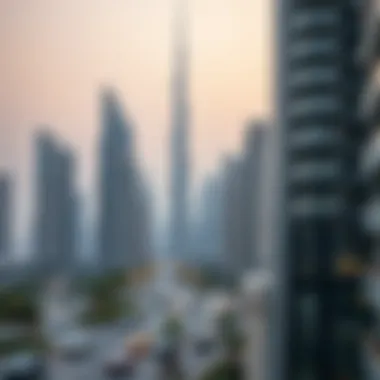

To better illustrate successful community development in Dubai, one might look at the examples of Jumeirah Beach Residence (JBR) and the Greens. These neighborhoods boast unique character and livability that stem from deliberate urban planning. JBR has become synonymous with cosmopolitan lifestyle, offering waterfront living paired with plenty of dining and entertainment options. The seamless integration of leisure facilities, public transportation, and pedestrian-friendly streets creates an engaging environment that attracts families and singles alike.
In contrast, the Greens exemplifies a more tranquil setting with its low-rise developments surrounded by lush gardens and natural water bodies. This community caters to those seeking a more peaceful lifestyle without sacrificing accessibility to city amenities.
"In Dubai, a successful community is not merely about buildings; it's about the connections formed between its residents."
Both neighborhoods showcase how thoughtful development can lead to thriving, active communities. These case studies reflect the importance of both planning and community involvement as fundamental to sustaining property values and ensuring long-term satisfaction.
In summary, community development in Dubai paints a vivid picture of interconnections that bolster not only the city's appeal but also the real estate market. Public amenities, active community engagement, and successful case studies together create an enriching living experience that stands as a testament to Dubai's progressive vision.
Cultural Influences
Cultural influences play a pivotal role in shaping the identity of Dubai. The city is a melting pot of traditions and innovations, reflecting a blend of local heritage and global perspectives. Understanding these influences is vital for investors, home buyers, and property managers, as they navigate the vibrant landscape of this dynamic metropolis. The interplay of culture not only defines the aesthetic of various neighborhoods but also informs the lifestyle choices and social interactions of residents.
Art and Architecture
Dubai's architecture is nothing short of spectacular. From the iconic Burj Khalifa rising majestically against the skyline to the stunningly designed Al Fahidi Historical Neighborhood, each building tells a story. The architectural scene in Dubai showcases a unique amalgamation of traditional Arabic designs and cutting-edge modernity. Developers are often inspired by cultural heritage, leading to structures that honor the past while embracing the future.
Moreover, public art installations contribute to the city's cultural fabric. Places like Dubai Design District are not just commercial hubs; they serve as canvases for local artists, making art accessible to everyone. Beyond mere aesthetics, these architectural choices enhance property values and can significantly impact investment opportunities.
Cultural Festivals and Events
Cultural festivals and events breathe life into Dubai's community spirit. Celebrations such as the Dubai Shopping Festival attract visitors from all walks of life, offering a plethora of local and international merchandise, entertainment, and food. Engaging in such events enhances community ties and encourages cultural exchange.
In addition, events like the Dubai International Film Festival and Art Dubai spotlight the region's growing influence in the global artscape. This not only enriches the cultural experience but also draws significant tourism. From a real estate perspective, areas hosting these celebrations often see spikes in foot traffic, making them lucrative investments.
"Cultural festivals are more than just entertainment; they are platforms for understanding and diversity, crucial aspects in fostering community ties."
Historical Landmarks
Dubai's historical landmarks provide a window into its rich past. The Dubai Museum, housed within the Al Fahidi Fort, is a testament to the city’s journey from a humble fishing village to a bustling metropolis. This is critical for prospective investors and home buyers, as these landmarks often increase the allure of nearby properties.
Additionally, places like the Sheikh Saeed Al Maktoum House and the Bastakiya Quarter offer an authentic glimpse into Emirati culture. They promote heritage tourism, which in turn benefits the local economy and enhances property appeal. Living near such landmarks can be valuable not just from a cultural standpoint but also in terms of long-term property value appreciation.
In summary, recognizing cultural influences in art, architecture, festivals, and historical landmarks is essential for anyone looking into Dubai's property landscape. These elements define the city's unique charm, enhancing both lifestyle and investment potential.
Technological Innovations in Real Estate
The realm of real estate in Dubai has been dramatically reshaped by a wave of technological innovations. These advancements are not just optional tools; they have become fundamental, shifting the very foundation of how properties are bought, sold, and managed. Embracing technology is essential for investors aiming to stay ahead in this fast-paced market.
In the 21st century, technological integration is pivotal. From property management software to online listings, the efficiency and effectiveness of real estate transactions hinge on technology. It allows for quicker decision-making, improved communication, and ultimately, a polished experience for both buyers and sellers. It is clear that without understanding the emerging tech trends, one may lag behind in this competitive sector.
Proptech Emerging Trends
Proptech, or property technology, is the buzzword that describes the innovations sweeping through the real estate industry. In Dubai, the rise of Proptech reflects a broader global trend where technology drives efficiency and new avenues for investment emerge.
Key trends in Proptech include:
- Blockchain Solutions: This technology simplifies property transactions by enhancing transparency and eliminating the need for intermediaries. Buyers can track ownership history seamlessly.
- Artificial Intelligence: AI tools are being used for predictive analytics, allowing investors to assess property values and market demand accurately. This leads to more informed investment decisions.
- Smart Contracts: These self-executing contracts with the terms written into code help in automating deals, making transactions smoother and faster.
Moreover, the sustainability of Proptech investments cannot be overstated. Implementing energy-efficient technologies not only boosts property values but also aligns with Dubai’s commitment towards environmental sustainability. Companies that jump on this bandwagon stand to gain a competitive edge.
Virtual Reality in Property Showcases
Virtual Reality (VR) is another game-changer in the Dubai real estate landscape. This technology provides a unique way for potential buyers and investors to experience properties without being physically present.
Imagine touring a luxurious villa in Palm Jumeirah while lounging on your couch in another city. With VR, this is not just a possibility; it’s a growing trend. Properties can be showcased through immersive environments, allowing clients to visualize spaces in a way that photographs simply can't convey.
Benefits of using Virtual Reality in property showcases:
- Enhanced Viewing Experience: Buyers get a 360-degree view, helping them imagine themselves in the space.
- Time Efficient: Save time for both buyers and agents, as clients can filter through their choices virtually before scheduling in-person visits.
- Global Reach: You can attract international investors effectively, breaking geographical barriers and opening up markets that were previously hard to penetrate.
Challenges in the Real Estate Sector
The real estate market in Dubai might seem like a goldmine at first glance, yet underneath its surface lies a host of complexities. Understanding the obstacles that investors, home buyers, and property managers face is crucial. Addressing challenges in the real estate sector not only ensures stability but also provides insights into future growth potential. Whether it’s navigating through fluctuating market dynamics or adapting to regulatory shifts, grasping these elements is essential for anyone looking to delve into Dubai's vibrant property scene.
Market Volatility
Market volatility refers to the rapid changes in property prices and demand, which can be influenced by various factors such as economic conditions, consumer trends, and even geopolitical events. In Dubai, the real estate landscape has seen its fair share of ups and downs, often leaving investors in a precarious position.
- Economic Trends: As oil prices fluctuate and global economic conditions change, demand for properties can shift unexpectedly. A sudden drop in tourism or a global economic downturn can lead to oversupply and falling prices.
- Demand and Supply Dynamics: New developments sprout like mushrooms after rain, but sometimes they outpace demand leading to a surplus of homes. This creates a cycle where prices dip, discouraging new investments and delaying projects.
- Investor Sentiment: Public perceptions and sentiments can also drive short-term volatility. When investors feel confident, they might rush to buy, inflating prices, while fear can lead to sudden sell-offs.
These factors contribute to a market that can turn on a dime, making it essential for stakeholders in Dubai’s real estate to stay wary and informed.
Regulatory Changes and Effectiveness
Navigating regulatory changes in Dubai’s real estate sector can often feel like walking through a minefield. Regulations are designed to ensure fair play, but their effectiveness can vary, resulting in confusion.
- Constantly Evolving Legislation: The government frequently updates rules and regulations to address market imbalances or attract foreign investment. However, staying updated is vital for property managers and investors to stay compliant.
- Regulatory Framework: Understanding the legal landscape is key. From knowing the ins and outs of ownership structures to understanding fees associated with property transactions, every detail matters.
- Enforcement Issues: In some cases, regulatory measures may be in place without effective enforcement. This can lead to situations where developers or investors don’t adhere to guidelines, ultimately damaging the market’s integrity.
Investors must therefore not only familiarize themselves with the existing regulations but also keep an eye on potential changes.
To thrive in Dubai's real estate sector, a deep understanding of both market volatility and regulatory changes is indispensable. They shape the landscape, presenting both risks and opportunities.
Navigating these complex challenges requires vigilance and adaptability, as those who successfully conquer them can reap substantial rewards in a bustling metropolis like Dubai. Ultimately, this challenge can lead to a more informed and resilient investor and management landscape.
Ending and Key Takeaways
As we wrap up our journey through Dubai's multifaceted real estate landscape, it's time to reflect on the vital aspects presented throughout this article. Understanding the local market trends, investment opportunities, and lifestyle considerations is crucial for both seasoned investors and newcomers looking to make informed decisions.
Summary of Insights
First off, the real estate market in Dubai stands out due to its dynamism and resilience. Key insights include:
- Rapid Development: The city has witnessed enormous growth in property developments, especially in emerging neighborhoods. Investors are advised to closely monitor areas such as Dubai Creek Harbour and Dubai Hills for promising returns.
- Cultural Diversity’s Impact: The melting pot of cultures in Dubai not only adds vibrancy but also influences consumer preferences and housing needs. This is essential knowledge for anyone aiming to cater to the local populace or expat community.
- Technological Adoption: Innovations in property technology, like virtual reality property tours, are reshaping how potential buyers engage with the market. Understanding these tools is vital for real estate managers and investors to stay competitive.
As we see the trends take shape, it is clear that a thorough grasp of these elements equips one with a solid foundation for navigating Dubai's property market - whether you're looking to buy a home, invest in commercial property, or manage real estate.
Final Thoughts on Dubai’s Property Market
Finally, considering the future of real estate in Dubai brings a sense of optimism and caution. While the region is characterized by its ambitious projects and luxurious lifestyle, potential buyers and investors must remain vigilant. The possibility of market corrections due to factors like global economic shifts or changes in local regulations must not be overlooked.
- Invest Wisely: Seek properties in areas projected for appreciation while keeping an eye on market trends.
- Be Prepared for Challenges: Understanding and adapting to regulatory changes can serve as a hedge against unpredictable market fluctuations.
- Leverage Available Resources: Utilize tools like Seekers Real Estate or propertyfinder.ae that provide valuable insights about the market, helping streamline decision-making.

